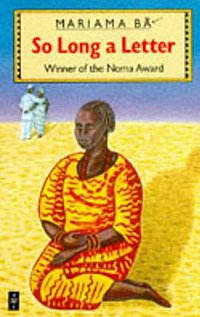So Long a Letter
 |
|
| Author | Mariama Bâ |
|---|---|
| Original title | Une si longue lettre. |
| Country | Senegal |
| Language | French |
| Genre | Novel |
| Published | 1981 Heinemann |
| Media type | Print (Hardback & Paperback) |
| Pages | 90 pp (hardback edition) |
| ISBN | (hardback edition) |
| OCLC | 9668743 |
So Long a Letter (French: Une si longue lettre) is a semi-autobiographicalepistolary novel originally written in French by the Senegalese writer Mariama Bâ. Its theme is the condition of women in Western African society.
So Long a Letter, Mariama Bâ's first novel, is literally written as a long letter. As the novel begins, Ramatoulaye Fall is beginning a letter to her lifelong friend Aissatou Bâ. The occasion for writing is Ramatoulaye's recent widowhood. As she gives her friend the details of her husband's death, she recounts the major events in their lives.
The novel is often used in literature classes focusing on women's roles in post-colonial Africa. It won the first Noma Prize for Publishing in Africa in 1980.
So Long a Letter is written as a series of letters between the main character Ramatoulaye Fall and her best friend Aissatou. Her letters begin after the death of her husband, Modou Fall, who died suddenly of a heart attack. She writes these letters during a four month and ten day mourning process known as 'iddah that is accustom to Muslim Senegalese culture. Her letters reminisce over past experiences and life events. She begins by describing to her friend the emotions that flood her during the first few days after her husbands death and speaks in detail about how he lost his life. She then continues on throughout the letters discussing the life she had with her husband which led up to betrayal after he took a second wife without her knowledge after 25 years of marriage. She talks about how she has dealt emotionally with the betrayal of her husband and how she grew throughout each life event that had happened to her.
Throughout the book there is also an underlying theme of feminism in Senegalese women. Romatoulaye was a school teacher and a well educated woman that strongly believed in women's ability to be forerunners in Senegal's society. Feminism fights strongly against religion and ways of a male dominated society that encapsulates Senegalese culture and gender roles. The character of Romatoulaye fights back against the normalcy of culture to push toward equity between genders.
Senegal was home to many indigenous peoples during precolonial times. Around the 9th century AD Islamization spread throughout Senegal due to the expansive trade routes thoughout Western Africa. Today, roughly 90 percent of Senegalese society follows Muslim religion while the remaining 10 percent follows forms of Christianity or mixed religions. Although many people follow Muslim religion, Arabic culture is not practiced in Senegal nor is Arabic spoken as the language. Much of their legal codes are from translated passages of the Qu'ran. French colonialism came to Senegal in the 1800s and enforced a separation of church and state. However many still abide by the Qu'ran's laws which shape ideas of gender roles, family life, marriage, and the patrilineal male dominated society.
...
Wikipedia
